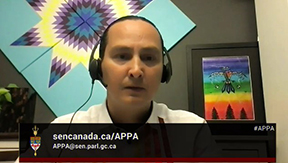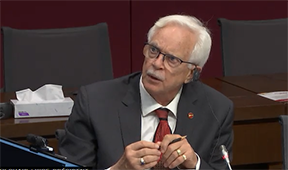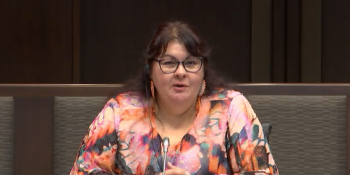Image Caption
Summary
Local Journalism Initiative Reporter
Windspeaker.com
Saskatchewan Treaty Commissioner Mary Musqua-Culbertson didn’t mince words when she spoke to members of the Senate Committee on Indigenous Peoples Oct. 25 about the difficulty in accessing Catholic Church records for Indigenous residential schools.
Not only has her office come up against barriers in trying to acquire student records for four of the former Indian residential schools in the Prince Albert diocese, but staff had to sign a non-disclosure agreement (NDA) for 21 years in order to access the diocese records they were told were housed at St. Paul University in Ottawa. However, she says, Prince Albert diocese records were never found there.
“Who specifically asks for a 21-year NDA? Who within their organization needs to die within that 21 years that is being protected?” asked Musqua-Culbertson, a lawyer who added that 21 years is not a usual timeframe.
“There is still people who are responsible for sexual abuse and deaths that are still alive that are still out there and they’re walking about within our institutions and in churches and in religious organizations. I do believe that religious organizations are there to protect religious organizations and the people within them,” she said.
Musqua-Culbertson drew the connection between persons of interest (POI) who were named by survivors during the Independent Assessment Process (IAP). The IAP was used as part of the Indian Residential Schools Settlement Agreement (IRSSA), signed in 2006. Through the IAP, survivors had to recount how they were sexually or physically abused in order to receive compensation beyond what the base common experience payment was.
Musqua-Culbertson served as legal counsel during the IAP.
“So you have these vast lists of POIs. Where is that database? Could that be a database? Because POIs are still protected…Those are people who were named as abusers,” she said.
She also pointed out that the IAP records will be destroyed unless survivors state otherwise.
Musqua-Culbertson recounted numerous incidents where the diocese gave her staff difficulties as they tried to access residential school records, including promising to release records and then reneging on those promises.
“When we come back up against this (many) barriers when it comes to the graves of missing children, it’s very disheartening,” she said.
The Office of the Treaty Commissioner of Saskatchewan officially built its library and archives in 2020, although documents began to be collected in 1989. In the past few years, the office has started to collect documents and church records relating to the four Indian residential schools of Delmas (west of Thunderchild First Nation), St. Anthony’s (Onion Lake Cree Nation), Beauval (English River La Plonge Reserve) and St. Michael’s (Beardy’s and Okemasis and One Arrow First Nations).
Raymond Frogner, head archivist for the National Centre for Truth and Reconciliation (NCTR), also recounted the frustrations involved with working with the Catholic Church. Centre researchers are combing through the oblate records housed at Société historique de Saint-Boniface (Manitoba) and Deschâtelets-NDC Archives (Quebec).
“We….are currently funding researchers to go into their archive, go through their records and tell them what records they have that they’ve been holding for decades. Tell them which ones are actually relevant to residential schools…They’re also asking us to pay for the digitization of those records because they aren’t digitized,” said Frogner.
“We all know the Catholic Church did not pay the compensation that they originally were assigned to pay up for the IRSSA.”
Four churches were signatories to the settlement agreement. While the Anglican, United, and Presbyterian churches have paid their agreed-upon negotiated amounts, the Catholic Church has fallen well short.
Frogner said that the archive at the NCTR held approximately four million records largely focused on the daily administration and operation of the schools.
“There is not a single one of the 141 schools that were part of IRSS agreement …that has a complete set of admission records, discharge records or quarterly returns. This is because, partly, the quality of record keeping was abysmal, to put it lightly,” he said.
Frogner recommended moving away from the legal perspective set out for the records to start to search the more expansive Indian residential school experience.
He suggested documentation be collected from five different fields.
Education would document curriculum, development and staffing at the schools, along with a focus on evangelical curriculum development and projects undertaken by the protestant and Catholic missionaries.
He pointed to health care records, much of which fell under provincial jurisdiction. Disease and pandemics forced children from the schools to hospitals where many died.
He noted that records are being held up in the court system because of ongoing or pending legal action. While court proceedings prevented the release of the records, Frogner said, a file list could be requested and then the records acquired when they were no longer restricted by the court.
A list could also be made of where records are being held in semi-active disposition awaiting processing within government offices or Library and Archives Canada, which would eventually be acquired by the National Truth and Reconciliation Centre.
Frogner’s proposed wider expanse could get limited support from the new Residential School Documents Advisory Committee headed by former Cowessess First Nation chief Cadmus Delorme. The committee has been mandated to work with federal government departments and agencies to scope out their documents in order to identify which are to be transitioned to the NCTR.

Delorme told the Senate Committee there are “grey areas” when it comes to which records the committee can transition. Records that deal with the 141 Indian residential schools acknowledged through the IRSSA are the targets. Other documents, like hospital records or records in the justice system, both of which will identify children, are not included in the committee’s “main mandate.”
However, Delorme said, “we can identify on the sideline other things that are going on because there will probably be other mandates similar to what we are doing. So let’s make sure we identify those (other records).”
Healthcare records were part of the work undertaken by Anne Panasuk, who was mandated for two years by the Secretariat for Relations with First Nations and Inuit of Quebec, as special advisor for support for families of missing children.
Panasuk told the committee about Bill 79, the Quebec legislation adopted in 2021 that gave Indigenous families the ability to get information about their children who went missing from health institutions in Quebec in the 1950s to the 1980s. This included children who were sent from residential schools to healthcare facilities.
The bill, said Panasuk, “unlocks medical archives and religious archives and it forces institutions to provide medical files…It bypasses the act of protecting information for the health department. Some religious organizations managed hospitals in the past—the diocese, the parishes, the cemeteries. So all these institutions are now obligated to provide information requested by the family.”
However, she said, as the bill is provincial, families do not have access to the records of children who were transferred to health institutions outside of Quebec.
Panasuk suggested that similar bills be adopted by other provinces and territories.
Musqua-Culbertson also suggested legislation that could be useful in addressing “when there is protectionism and when there is barriers put in place.”

Senator David Arnot, former chief commissioner of the Saskatchewan Human Rights Commission and federal treaty commissioner, referred to what the Senate Committee had heard as a “litany of frustration with the non-compliance truculent stonewalling purposeful barriers” that was being faced by those trying to gather records from the Catholic Church.
What the Senate Committee heard Oct. 25 was in direct contrast with what they were told on Sept. 27 by Father Ken Thorson, provincial superior of the Oblates of Mary Immaculate (OMI) Lacombe Canada.
See our story here: https://windspeaker.com/news/windspeaker-news/senator-digging-delay-res…
Thorson said that since the 215 unmarked graves had been identified at Kamloops Indian Residential School, the Catholic Church’s “commitment has been renewed and strengthened” to work with researchers and survivors.
However, Arnot called what they had heard from Musqua-Culbertson and Frogner of their interactions with the Catholic Church as “incomprehensible conduct.”
Other senators described the testimony as “disturbing”, “appalling”, and “shocking.”
The Senate Committee, chaired by Mi’kmaw Senator Brian Francis from Prince Edward Island, is holding a series of hearings as follow-up to recommendations included in their interim report, Honouring the Children Who Never Came Home: Truth, Education and Reconciliation, released last July.
That report was the result of hearings that took place in March where the Senate Committee heard from representatives from the Office of the Independent Special Interlocutor for Missing Children and Unmarked Graves and Burial Sites associated with Indian Residential Schools, and the NCTR about the difficulty in accessing records that could be used to either identify children who died at Indian residential schools or locate where they were buried.
The Senate Committee has invited specific witnesses to answer questions on why all residential school documents have not been disclosed.
Windspeaker is owned and operated by the Aboriginal Multi-Media Society of Alberta, an independent, not-for-profit communications organization.
Each year, Windspeaker.com publishes hundreds of free articles focused on Indigenous peoples, their issues and concerns, and the work they are undertaking to build a better future.
If you support objective, mature and balanced coverage of news relevant to Indigenous peoples, please consider supporting our work. Whatever the amount, it helps keep us going.

